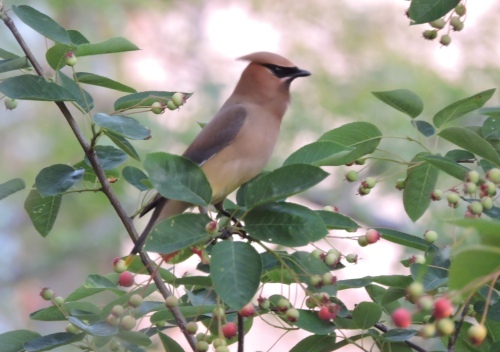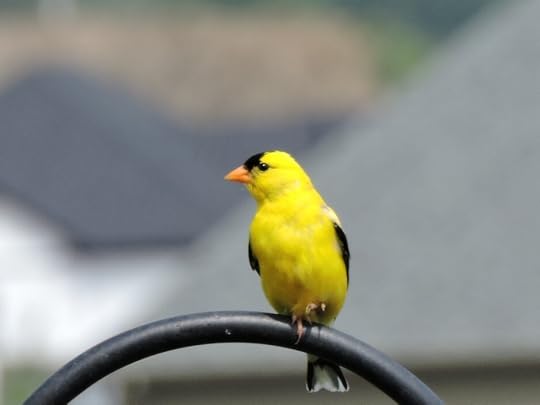All Nature Sings and so Should We
When I lived in a wooded setting I wrote the following about birdsong filling the air.
Robins serenade the rising sun. A cardinal whistles its distinctive tune. Goldfinch warble. The melodic notes of song sparrows reverberate from tree to tree. Mourning doves coo. Chickadees chatter. Somewhere down the slope near the stream a bass drum sounds—a ruffled grouse strutting his stuff. Not to be outdone a woodpecker picks up the tune on a hollow tree. The echoes reverberate throughout the valley.
I envy our feathered friends their musical prowess. Ever since grade school when I failed an audition for a part in a Stephen Foster musical, I’ve avoided singing in public. Tough, when one is a pastor expected to lead in congregational singing! I had to make it very clear, wherever I served, that singing was not one of my abilities. When seated in a congregation I keep my voice low enough so that neighboring worshippers aren’t distracted by my off-key renditions. When I wax too loud, Mary Helen gives me a jab.

The fact that I’m musically challenged doesn’t mean I don’t love music. I often tune in to the local classical station or play CD’s while I work. Music is one of God’s greatest gifts to us. It captures our moods. It encourages our hearts. It instructs our minds. It lifts us from darkness into light. Through music we rise on the wings of angels to join the throngs around the throne.
With such a wonderful God to celebrate, it’s no wonder that God’s children love to sing. From the songbook of the Old Testament to “The Messiah”; from Isaac Watts and Charles Wesley to the explosion of contemporary music in our day—whatever you might think about today’s bards—believers sing on their way to heaven.
Moses and Deborah celebrated deliverance with song. David sang everywhere; in the mountains with his flock of sheep, deep in a cave when hunted by his enemies, on the road to Zion while bringing up the ark and especially in the temple. His son, Solomon, composed 1005 songs, including the sweet “Song of Songs”. Even one of Job’s erstwhile comforters got it right when he spoke of God giving songs in the night. Paul and Silas sang in prison. In the Bible’s climactic vision of future glory we see the hosts of heaven singing the song of Moses and the new song of the Lamb.[1]
Around the earth churches emulate the Bible’s songsters. Sadly, embarrassment at my poor singing voice restricts how much I sing around the house. Perhaps that’s why in the morning one of the first things I do is leaf through the hymnbook. What a treasure! Like the songbirds it encourages us to awaken the day with song.
When morning gilds the skies,
My heart awaking cries,
May Jesus Christ be praised. [2]
In the morning, before our necessary duties intervene, and as the day ends, we would be wise to emulate the sweet psalmist of Israel who wrote, “Where morning dawns and evening fades you call forth songs of joy.”[3]
Joyful, joyful we adore thee
God of glory, Lord of love;
Hearts unfold like flowers before thee,
Opening to the sun above.[4}
Overcome with a poetic vision of God’s providential care for the world, David exults, “the grasslands . . the hills . . . the meadows . . .the valleys . . . they shout for joy and sing.”[5] Although all creation groans in its frustration over the effects of the fall, yet a mysterious consciousness of the creative majesty of God overcomes creation’s reticence, and calls forth songs of praise.[6]

I like to think that the birds join that chorus.
This is my Father’s world,
And to my listening ears
All nature sings, and round me rings
The music of the spheres. [7]
Even when enemies plot our harm or trouble dogs our footsteps David teaches us to find renewed courage through singing of God’s glories. Pursued by Saul’s men, David composed a song that concludes; “I will sing of your strength, in the morning I will sing of your love; for you are my fortress, my refuge in times of trouble.”[8]
A mighty fortress is our God
A bulwark never failing;
Our helper He amid the flood
Of mortal ills prevailing. [9]
The Scriptures urge us to sing in darkness and pain and trouble and night. Perhaps this habit of singing in prison helped the apostle Paul to pen the joyful and enlightening prison epistles from his prison cell.
He giveth more grace when the burden grows greater;
He sending more strength when the labors increase.
To added affliction He addeth His mercy
To multiplied trials, His multiplied peace.[10]
The songs we sing around the Lord’s Table are especially meaningful.
Jesus, Thy blood and righteousness
My beauty are, my glorious dress;
Midst flaming worlds, in these arrayed,
With joy shall I lift up my head. [11]
Since my singing has been rather circumspect during my lifetime, I trust there will be much song at my funeral. Morose thought? Hardly. Consider:
Face to face with Christ my Savior,
Face to face—what will it be—
When with rapture I behold Him,
Jesus Christ who died for me?
Or this one:
There’s a land that is fairer than day,
And by faith we can see it afar,
For the Father waits over the way
To prepare us a dwelling place there.
I have a feeling that my voice will sound like that of an angel in that land that is fairer than day!
Heavenly Father, remind me to look more often in the hymnbook. Such a wealth of uplifting praise, heartening instruction, and heart-felt comfort! Blessed Holy Spirit, may the birdsong I hear every morning remind me to lift my heart often in praise and thanksgiving.
(Let me know your thoughts on this subject. If you appreciate this blog, please pass it on. If I can help you spiritually, let me know. Further articles, books, and stories at: Facebook: Eric E Wright Twitter: @EricEWright1 LinkedIn: Eric Wright ; Eric’s books are available at: https://www.amazon.com/Eric-E.-Wright/e/B00355HPKK%3Fref=dbs_a_mng_rwt_scns_share)
[Watch for news of the reprinting of this book; Down A Country Road]
[1] Deut. 32; Judges 5; 1 Kings 4:30; Job 35:10; Acts 16:25; Eph. 5:19; Rev. 5:9; 14:3; 15:3
[2] Translated by Edward Caswall from Katholisches Gesangbuch, Wurzburg, 1828
[3] Psalm 65:8
[4] Text by Henry Van Dyke, Music by Beethoven. Note all hymns quoted are in the public domain.
[5] Psalm 65:12,13
[6] See Rom 8:19-21
[7] Maltbie D. Babcock
[8] Psalm 59:16
[9] Martin Luther, translated by Frederick H. Hedge
[10] Annie Johnson Flint
[11] Nicolaus L. von Zinzendorf: translated by John Wesley



